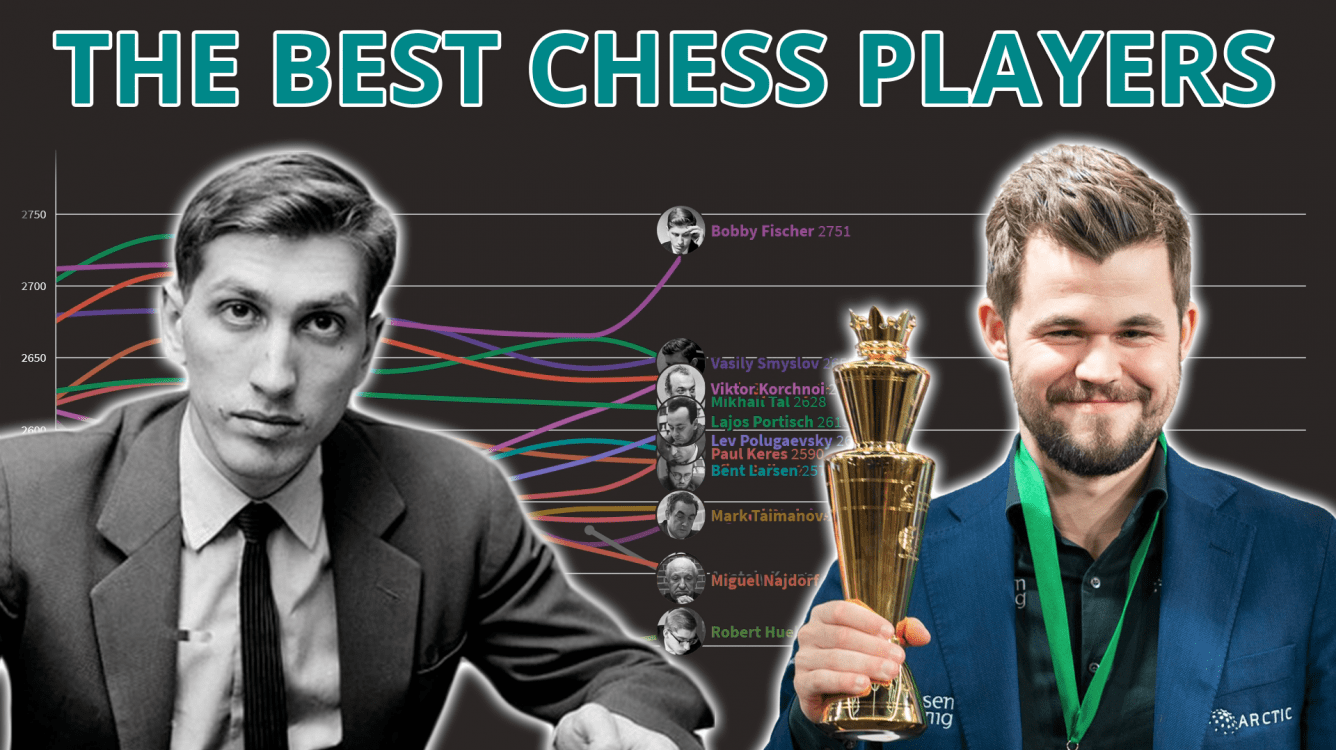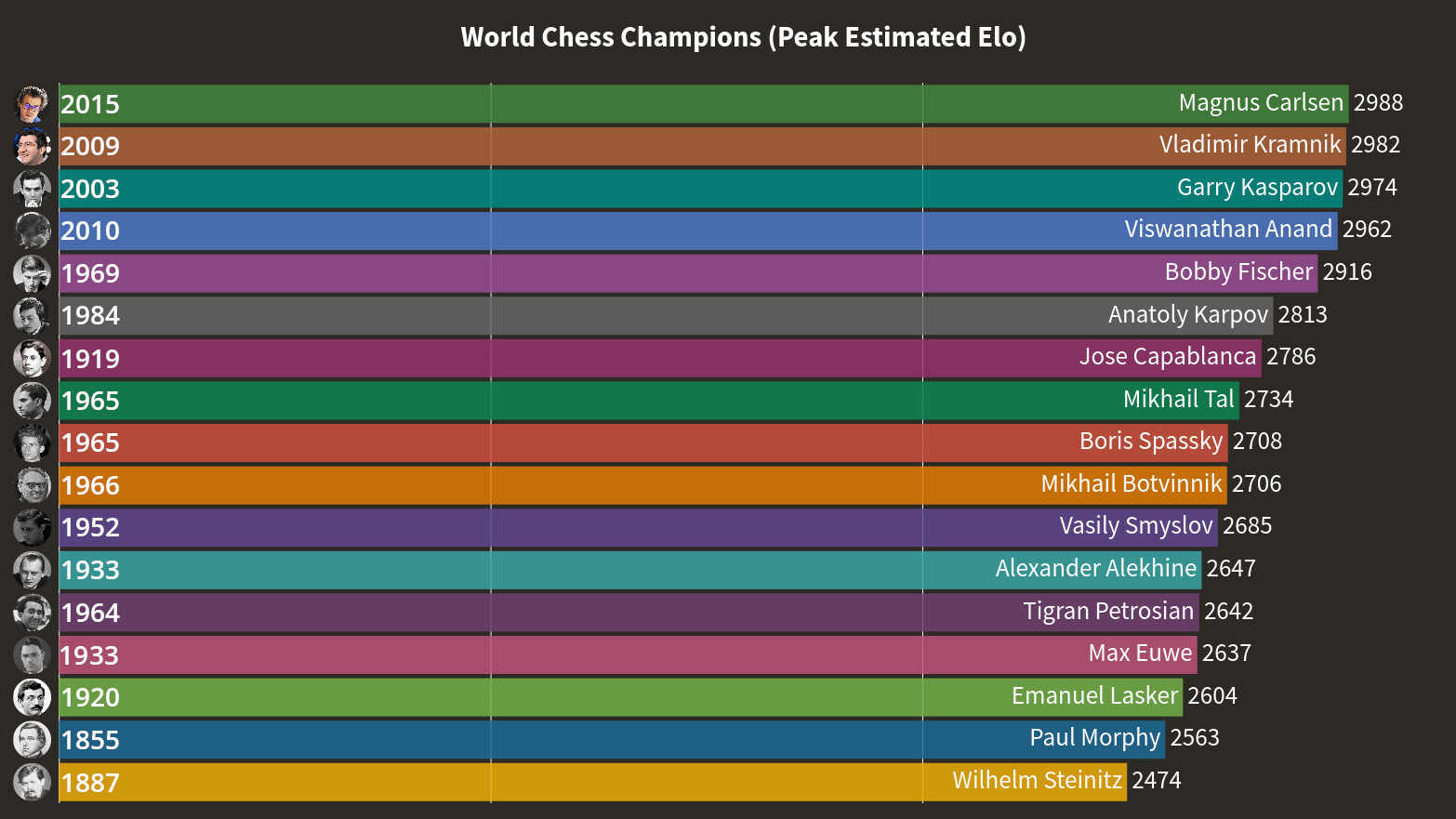
The Best Chess Players Over Time
Who are the strongest chess players of all time?
There are nearly as many opinions on the relative strength of great chess players as there are chess players. Opinions have been based on dominance, career longevity, brilliance of play, and numerous other factors. Here is one ranking from our staff that considers many of these factors.
Objectively though, which chess players have played the best chess, move by move, over the years? Today we are equipped to attempt to answer that question by comparing chess moves from great chess players with the suggested best moves according to modern chess engines.
Video
Methodology
We collected the complete classical game archives of 78 of the strongest chess players across history. Using chess.com/analysis, game reports were generated for all games at the maximum analysis depth. The computed accuracy scores were then averaged for each active year for each player. For example, Bobby Fischer's average accuracy in 1972 was 98.4111.
- Inactive years with less than 10 games (notably WWI and WWII) were dropped from our analysis. We assigned the average value of the previous and next active year as the estimated accuracy for that year.
- Players' junior years were excluded from analysis.
- Modern players were marked as inactive or retired once they had either announced retirement or were no longer actively competing in world championship cycles.
- To minimize noise in the data, we applied exponential smoothing in Excel with a smoothing factor of 0.5.
- We converted the resulting accuracy values to Elo using this conversion map. Performances in excess of 3000 were rounded to 3000.
The World Champions (Peak Elo)
Who were the best world champions by peak estimated Elo? Here is our ranking of all the world chess champions by the highest Elo estimated in any given year by our system.
Magnus Carlsen is the best chess player of all time according to our system, but Kramnik, Kasparov, and Anand are all ranked extremely close. Also standing out are Bobby Fischer and Jose Capablanca who were decades ahead of their peers in terms of raw chess skill.

Observations
Here are some observations that struck us.
- Chess skill has increased over time.
Paul Morphy, Adolf Anderssen, and Wilhelm Steinitz were tremendous chess players, far ahead of their time, but their objective skill level is below that of modern players. In general, each generation has built and improved on the collective chess understanding of prior generations.
- Almost every world chess champion has at some point been estimated to be the best chess player in the world.
This method takes an entirely fresh analytic approach to evaluating chess skill. It's not affected by the fame and status of players or their Elo rankings. Many non-world champions such as Harry Pillsbury, Carl Schlechter, Reuben Fine, Samuel Reshevsky, and Wesley So topped our chart at some point without achieving the ultimate chess title; however, all of the world champions except Boris Spassky (overshadowed by Fischer) were at some point ranked as the best chess player in the world according to our approach. It is a testament to the fairness of chess that the title of world champion has been consistently claimed by extremely deserving players.
- World chess champions have typically had a significant incumbent advantage.
In multiple cases, the best chess player in the world (for example Capablanca, Fischer, and Kasparov) has struggled to obtain and then triumph in a title match. This may be attributed to many advantages that the world champion has typically had including the right to select challengers, the right to impose conditions, and extra experience in match play. The challenger meanwhile must triumph in a lengthy qualification process before they can gain the ability to compete directly against the reigning champion.
- Many players played their most accurate chess long after their perceived peaks, sometimes after losing the world championship title.
In many cases, chess players played their most accurate chess late in their careers, possibly after they had lost a world championship title or after they were perceived to be one of the top players in the world. This suggests to us the possibility that great chess players may retain and even increase their skill much later into their careers than is often thought, but they are often eclipsed late in their careers by the next generation of rising stars.
Which players do you consider the best of all time? Post in the comments below!
Want to seem more data visualizations? Check out the following videos:






